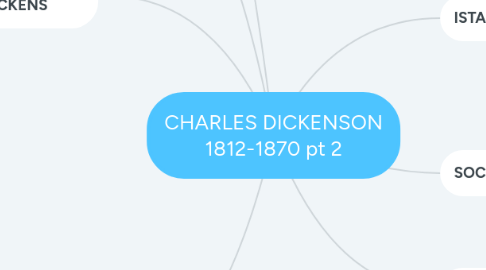
1. NARRATIVE MODENS AND LANGUAGE
1.1. Dickens was first storyteller
1.2. His novels were influenced by: Bible, fairy tales, fable and nursery rhymes
1.2.1. The publication in monthty or weekly newpaper or magazines
1.3. He used of colloquial expressions and adapted spelling to convery a sense of the natural rhythms of London speech
2. CHARACTERS
2.1. They may be roughly divided into good and evil, but he doesn' t create types
2.2. They may sometimes be exaggerated and grotesque
2.3. He was not concerned with the spiritual side of them.
2.4. He was an observer of the external qualities of people.
3. DICKENS' S AIM AND THE ROLE OF CHILDREN IN DICKENS
3.1. Children are often the most important characters in Dickens's novels
3.2. Dickens's task was never to induce the most wronged and suffering to rebel or even encourage discontent
4. OLIVER TWIST
4.1. Oliver Twist first published in monthly instalments between 1837 and 1839, show she system' s treatment of an innocent child born and raised in the workhous system. It tells the story of a young orphan whose mother dies right after giving birth to him. Sent to a parochial orphanage he and the other orphans are treated terribly and fed very little. At the age of nine he is sent to a workous. The other boys, unable to bear their hunger and longer, decide to draw straws to choose who will have to go up and ask for more food. Oliver loses On the appointed day, after finishing his usual thin liquid food, he asks for mor. Mr. Bumble, the irritated beadle and the board decide to punish Oliver so they consign him to the parochial undertaker, Mr. Sowerberry. Oliver runs. He meets another boy named Jack Dawkins.The Dodger tells Oliver he can come with him to a place where a gentleman will give him a place to sleep and food. Oliver follows, and the Dodger takes him to an apartment in London where he meets Fagin, the “gentleman". Oliver understands that Fagin’s boys are all pickpockets and thieves, but not until he is wrongfully accused of their crime of stealing an old gentleman’s handkerchief. He is arrested, but the bookseller comes just in time to the court and says that he saw that Oliver did not do it. The gentleman, whose handkerchief was taken, Mr. Brownlow, decides to help him. one day, when Mr. Brownlow entrusts Oliver to return some books to the bookseller for him, the gang kidnaps him, taking him back to Fagin. Oliver is forced to commit burglary but when he enters the house, he is shot by one of the servants. The boys escape
4.1.1. The kind owner, Mrs. Maylie, and her beautiful niece Rose, decide to protect him from the police and nurse him back to health. They take him to see Mr. Brownlow, but they find his house empty. He has moved to the West Indies. Meanwhile, Fagin and his mysterious partner Monks have not given up on finding Oliver, and one day Oliver wakens from a nightmare to find them staring at him through his window. He raises the alarm, but they escape. Nancy, a prostitute, decides to inform Mrs. Maylie that who has been trying to destroy Oliver so that he can keep his whole inheritance. Nancy tells Rose and Mr. Brownlow how to find Monks, but still refuses to betray Fagin and Sikes, or to go with them. Mr. Brownlow has in the meantime found Monks, who finally admits everything that he has done, and the true case of Oliver’s birth. Fagin is arrested and tried after a visit from Oliver, is executed. Oliver , Mr. Brownlow, and the Maylies end up living in peace and comfort in a small village in the English countryside.
